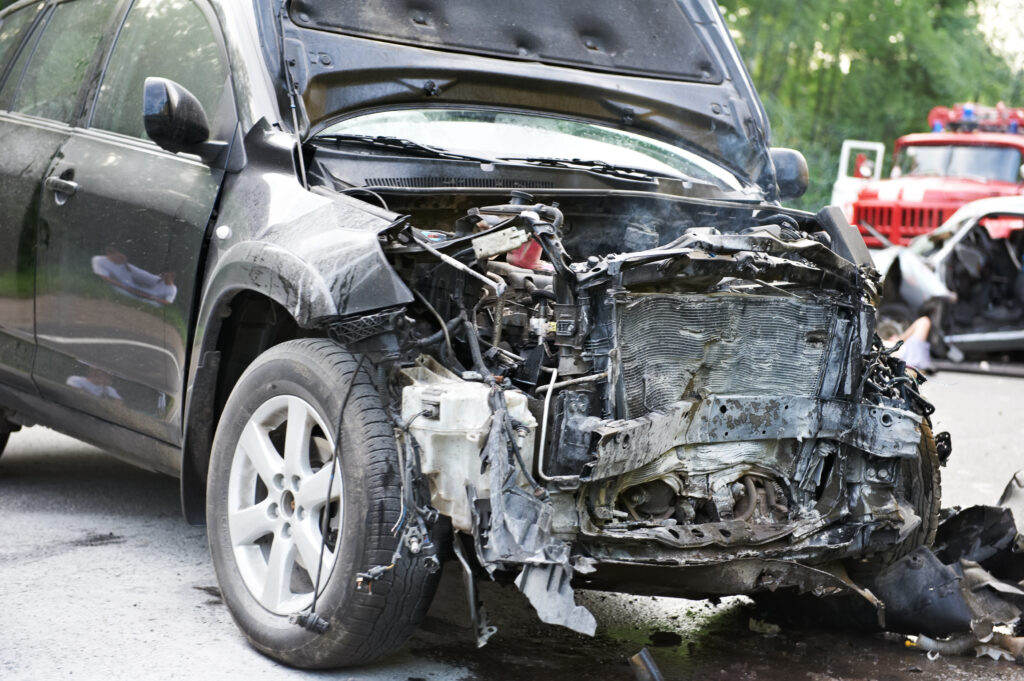Interstate 40 in Raleigh, North Carolina, poses significant dangers due to its high traffic volume and frequent accidents. The interstate spans across urban areas, leading to congested traffic conditions during peak hours.
Moreover, aggressive driving behaviors, distracted driving, and speeding contribute to the risk of collisions. Inclement weather conditions, such as heavy rain or fog, further increase hazards for motorists.
If you suffered injuries in an I-40 accident that took place in Raleigh, it’s important that you contact an experienced Raleigh car accident attorney as quickly as possible. Your lawyer can promptly investigate the circumstances surrounding the accident, take the necessary legal steps on your behalf, negotiate with insurance companies, or pursue a favorable litigation result in the state court system for you.
How Do Car Accidents Frequently Occur on I-40 in Raleigh?
Interstate 40 is an important artery for commuters and travelers, but it also has numerous car accidents due to the negligence of other drivers. Common examples of negligence leading to accidents on Interstate 40 are as follows:
- One common cause of accidents on Interstate 40 is reckless driving. This includes speeding, sudden lane changes without signaling, and tailgating. Speeding, in particular, increases the likelihood of accidents as it reduces reaction times and makes it harder to control vehicles, especially in congested traffic or adverse weather conditions.
- Distracted driving poses another significant risk. With the prevalence of smartphones and other electronic devices, drivers often revert to texting, browsing the internet, or even watching videos while driving. Such distractions divert attention away from the road, leading to delayed reactions and an increased chance of rear-end collisions or side-swiping accidents.
- Fatigue is another dangerous factor contributing to accidents on Interstate 40. Long commutes or late-night travel can cause drivers to become drowsy or fall asleep at the wheel, impairing judgment and reaction times. Fatigue-related accidents often result in severe consequences due to the high speeds typically involved on the interstate.
- Aggressive driving behaviors, such as road rage incidents or aggressive lane merging, also frequently lead to accidents on Interstate 40. When drivers engage in aggressive behaviors, they disregard safety procedures and often escalate minor disputes into dangerous situations, putting themselves and others at risk.
- Impaired driving remains a persistent problem on North Carolina highways, including I-40. Alcohol and drug impairment significantly impair motor skills, decision-making abilities, and reaction times, making impaired drivers more likely to cause accidents through swerving, sudden stops, or failure to yield.
- Poor weather conditions increase the risks other drivers’ negligence poses. Raleigh experiences a range of weather patterns, from heavy rain and fog to occasional snow and ice. Drivers who fail to adjust their speed and driving behavior to match the weather conditions contribute to a higher incidence of accidents, including multi-vehicle pile-ups.
- Finally, failure to adhere to traffic signals and signs can lead to devastating accidents. Ignoring red lights, stop signs, or failing to yield the right-of-way at interchanges and ramps can result in T-bone collisions or other serious accidents, especially during peak traffic hours.
While Interstate 40 in Raleigh serves as a vital transportation route, it also presents numerous risks due to the negligent behaviors of other drivers. If you suffered injuries in an accident on I-40, a knowledgeable Raleigh car accident lawyer can investigate the circumstances and pursue a claim or lawsuit for compensation on your behalf.
Common Injuries in Car Crashes on I-40
Car accidents on Interstate 40 in Raleigh can result in a variety of injuries for victims, ranging from minor to severe, depending on the nature and intensity of the collision.

Whiplash is one of the most common injuries sustained in car accidents on I-40. It occurs when the head and neck suddenly jerk forward and then backward, causing strain on the neck muscles and ligaments. Symptoms of whiplash include neck pain, stiffness, headaches, and sometimes shoulder or back pain. Even though whiplash is a relatively minor injury, it can still cause discomfort and require medical treatment.
Soft tissue injuries are another prevalent consequence of car accidents. These injuries involve damage to muscles, tendons, and ligaments throughout the body. They can range from strains and sprains to more serious tears and contusions. Soft tissue injuries often result in pain, swelling, bruising, and reduced range of motion. Recovery may require physical therapy or other forms of rehabilitation.
Fractures are also common in high-impact collisions on I-40. Bones in the arms, legs, ribs, and pelvis can fracture due to the force of the impact or from being crushed within the vehicle. Fractures vary in severity, from hairline fractures that heal relatively quickly to compound fractures that require surgical intervention and extensive recovery time.
Furthermore, head injuries, including concussions and traumatic brain injuries (TBIs), are serious outcomes of car accidents on Interstate 40. Even with seat belts and airbags, the sudden impact of a collision can cause the head to strike the steering wheel, window, or dashboard. Head injuries can range from mild concussions with temporary symptoms to severe TBIs that result in long-term cognitive impairments and disabilities.
Spinal cord injuries are among the most devastating consequences of car accidents on I-40. Damage to the spinal cord can lead to partial or complete paralysis, affecting mobility and sensation below the site of injury. Spinal cord injuries often require extensive medical treatment, rehabilitation, and lifelong care.
Internal injuries may occur even without visible external trauma. The force of a collision can cause internal organs to bruise, bleed, or become punctured. Internal injuries can be life-threatening and may require emergency surgery to repair.
Car accidents on Interstate 40 in Raleigh can cause a wide range of injuries, from minor to severe, affecting victims’ physical health and well-being. Seeking ongoing medical attention after an accident is crucial, as well as seeking prompt representation from a Raleigh car accident attorney.
How Can a Raleigh Car Accident Lawyer Help During Your Case?
A Raleigh car accident lawyer plays a vital role in helping individuals navigate the legal proceedings following a car accident. Their skill and guidance can significantly affect the outcome of a case.
First, legal consultation and advice are crucial services that car accident lawyers provide. They can assess the details of the I-40 accident, evaluate the strengths and weaknesses of the case, and provide personalized advice on the best course of action. This initial consultation helps clients understand their legal rights and options moving forward.
Investigation and evidence gathering are key aspects of a car accident case. Lawyers have the resources and experience to conduct thorough investigations, including gathering police reports, witness statements, medical records, and any other pertinent evidence. This evidence is critical for building a strong case to establish liability and demonstrate the extent of damages suffered.
Negotiation with insurance companies is another critical role of a car accident lawyer. Insurance companies often try to minimize payouts or deny claims altogether. A skilled lawyer knows how to negotiate effectively with insurance adjusters to ensure that their clients receive fair compensation for medical expenses, lost income, property damage, and pain and suffering.
Representation in court is essential if a settlement cannot be reached through negotiation. Experienced car accident lawyers can navigate the courtroom environment. They can present arguments persuasively, cross-examine witnesses, and effectively advocate for their clients’ rights before a judge and jury.
Handling paperwork and legal procedures can be overwhelming for individuals unfamiliar with the legal system. A car accident lawyer manages all necessary paperwork, filings, and deadlines associated with the case. This ensures that procedural requirements are met and that the case progresses smoothly through the legal system.

Skill in assessing damages is crucial in determining the full extent of compensation owed to accident victims. Lawyers understand how to quantify damages, including economic losses such as medical bills and lost income, as well as non-economic damages like pain and suffering. They work hard to ensure that car accident victims receive fair compensation for all aspects of their injuries and losses.
Support and guidance throughout the legal process are invaluable to accident victims and their families. A compassionate lawyer provides emotional support, answers questions, and keeps accident victims informed about the progress of their cases. This support helps lessen stress during a challenging time and allows accident victims to focus on their recovery.
Recovering Financial Compensation for Various Losses
Victims of car accidents on Interstate 40 in Raleigh, North Carolina, may be entitled to various types of compensation for the injuries and damages they suffer due to the negligence of others. Understanding these forms of compensation is essential for ensuring that victims receive fair restitution for their losses.
Medical expenses are one of the primary categories of compensation. This includes reimbursement for all reasonable and necessary medical treatments related to the accident. It covers hospital bills, surgery costs, prescription medications, rehabilitation services, and any other medical expenses incurred to treat injuries sustained in the accident.
Lost income compensation is available for victims who are unable to work due to their injuries. This includes both the income lost during recovery and any future loss of earning capacity (if the injuries result in a long-term or permanent disability). Documentation from employers and medical professionals is important to substantiate these claims.
Property damage compensation covers the repair or replacement of vehicles and other property damaged in the accident. This includes the cost of repairs, depreciation of value, or replacement costs if the vehicle is a total loss. The claimant often uses receipts and estimates from repair shops to establish this compensation.
Pain and suffering compensation seeks to compensate victims for physical pain, emotional distress, and psychological trauma that the accident and resulting injuries caused. Unlike economic damages (for example, medical expenses and lost income) that have a clear monetary value, pain and suffering compensation is more subjective and typically requires evidence such as medical records, testimony from mental health professionals, and statements from the victim and their loved ones.
Loss of consortium compensation may be available to the spouse or family members of the victim. It compensates for the loss of companionship, support, and intimacy due to the accident-related injuries.
In addition, a claimant may seek punitive damages in cases of extreme negligence or intentional wrongdoing by the at-fault party. Their purpose is to punish the wrongdoer and deter similar misconduct in the future – rather than compensate the victim directly for their losses. Punitive damages are less common and typically require clear and convincing evidence of egregious behavior.
Consulting with an experienced car accident lawyer can help victims understand their legal options, accurately assess the value of their claims, and navigate the process of seeking compensation from insurance companies – or through legal action. This ensures that victims receive the full and fair restitution they deserve under the law.
Settlement Versus Litigation Following an I-40 Car Crash
After experiencing a car crash on Interstate 40 in Raleigh, North Carolina, victims face a critical decision — whether to pursue a settlement with insurance companies or proceed with litigation through the court system. Understanding the differences and implications of each option can help victims make an informed decision based on their specific circumstances.

Settlement offers a quicker resolution compared to litigation. In a settlement, the victim and their legal representation negotiate with the insurance company or the at-fault party to reach an agreement outside of court. Settlements often result in a lump-sum payment that covers medical expenses, lost income, property damage, and possibly pain and suffering. One of the main advantages of settlement is avoiding the time-consuming and uncertain process of litigation.
Pros of Settlement:
- Speed — The involved parties can reach settlements relatively quickly, allowing victims to receive compensation sooner.
- Certainty — The outcome of a settlement is predictable compared to the uncertainties of litigation.
- Cost — Settlements typically involve lower legal fees and expenses compared to prolonged litigation.
Cons of Settlement:
- Potential Undervaluation — Insurance companies may offer lower settlements to minimize costs, which may not fully compensate victims for their losses.
- Limited Recovery — Once the victim accepts a settlement, they typically waive their right to pursue further compensation for the same accident.
Litigation, on the other hand, involves filing a lawsuit in court against the at-fault party or parties. Litigation is more formal and involves a series of legal procedures, including discovery, motions, and potentially a trial before a judge or jury. The court determines the outcome of litigation and may award damages if the victim proves the negligence of the at-fault party (defendant).
Pros of Litigation:
- Potential for Higher Compensation — If successful, litigation may result in higher compensation than what is typical in settlements.
- Legal Protections — Litigation allows victims to present their case before a judge or jury, ensuring that their rights remain protected and justice is served.
Cons of Litigation:
- Time-consuming — Litigation can be lengthy and may take months or even years to reach a resolution, thereby delaying compensation.
- Uncertainty — Court outcomes are unpredictable, and there is no guarantee of winning the case or obtaining the desired amount of compensation.
Consulting with an experienced car accident lawyer in Raleigh can provide valuable guidance in making this decision, ensuring that victims understand their options and pursue the path that best meets their needs for compensation and justice.
Talk with an Experienced Raleigh Car Accident Lawyer Today
If you suffered injuries in a car accident on Interstate 40 in Raleigh, North Carolina, you need to speak with a skilled car accident attorney right away. Your Raleigh personal injury lawyer can determine your legal options, file a claim or lawsuit on your behalf, and pursue the maximum compensation available to you in your case.